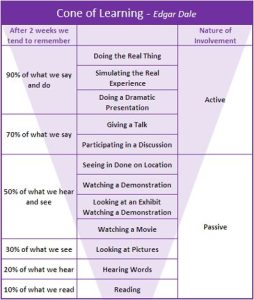HR learning pathways are essential for professional growth. Having a clear roadmap to guide the learning endeavours will make all the difference. Discover the power of structured HR training programmes tailored to the needs of HR professionals.
HR training is essential for equipping professionals with the knowledge and skills needed to fulfil their roles effectively within organisations. The general belief is, the more information we have, the better our decisions will be and the more we learn. We even pursue more information that might even be inconsequential with our final decision!
In today’s dynamic business environment, staying ahead of the latest trends, Works Council regulations and HR practices is not just a desire but a necessity. Searching online for information can be overwhelming with all the available knowledge and whilst you might think you need more information, you sometimes don’t.
What happens is you MILK.
You have More Information but Less Knowledge.
Embark on a journey to elevate your HR expertise in our ever-changing professional landscape and learn about the crucial need for an effective learning path.
Table of Contents
What Is a Learning Pathway?
A learning path is essentially a personalised journey of acquiring knowledge and skills that are tailored to an individual’s professional goals or a group goal. It is more than a collection of training sessions. It is a well-thought-out sequence of learning experiences designed to build expertise progressively.
To understand the effectiveness of a learning path, let’s delve into Edgar Dale’s Cone of Learning. This is a theory that highlights different levels of retention based on the type of learning activity.
The idea is that individuals remember things better when they actively participate in activities instead of just passively receiving information, like reading or listening.
Depending only on reading and listening may lead to not remembering much. The active methods, such as interaction and participation in courses and programmes will enhance the learning experience. Practical demonstrations and simulations, such as user cases, or role-playing exercises are significantly boosting retention.

By understanding the significance of a learning path and incorporating Edgar Dale’s Cone of Learning, HR professionals can create a roadmap that not only enhances their knowledge but also propels them toward success.
A Learning Path for HR Professionals
1. Goal Alignment
A learning path supports in aligning the objectives of the HR professional such as skill development, or growth. This adaptability ensures that HR professionals can navigate legal complexities confidently.
2. Efficient Learning
Having a defined learning path allows the professional to prioritise learning activities. It forces the professional to think about the primary topics of interest, instead of wandering through various topics with less focus.
3. Continuous Improvement
The roles and responsibilities of HR professionals continue to evolve. A learning path is crucial for acquiring and enhancing skills relevant to emerging HR trends, such as workforce analytics, digital HR technologies, and employee engagement.
4. Effective Talent Management
HR professionals play a pivotal role in the strategy regarding talent acquisition, development, and retention. A learning path equips them with the knowledge and strategies needed to inform the business about talent management, employee engagement strategies, and succession planning.
5. Measurable Progress and Making an Impact
With a learning path, the HR professional can track progress more effectively. Whether through practical applications, having measurable indicators ensures that HR professionals are advancing their skills.
6. Prevention of Being Overwhelmed
The amount of information available can be overwhelming, not knowing where to begin or what to learn next. A learning path breaks down the learning process into manageable steps, preventing information overload and allowing members to grasp concepts gradually.
The Levels of Learning Pathways
A learning path is designed to give learners a clear route through various training courses. It breaks the knowledge down into manageable chunks, allowing learners to easily absorb information and progress smoothly through each course.
There are three types of learning paths – foundation, advanced, and excellence. Each learning path for HR professionals aims to achieve a particular objective. The Human in Progress Academy has designed all HR courses to lead professionals progressively through a series of skills and knowledge levels with a tiered learning approach.
Foundation
These courses prove fundamental knowledge and skills, serving as a starting point for members new to the HR field.
Advanced
Building upon foundational concepts, these courses delve deeper into topics, offering a more in-depth understanding about communication and ways of working.
Excellence
At this level, courses aim for evolution, with advanced strategies, specialised knowledge, and an elevated level of expertise in HR subject matters.
HR Learning Pathways
Having outlined the learning path and the various levels of that path, the next inquiry arises: what training courses could include an HR learning path?
Step 1: Conduct Training Needs Analysis
A training analysis involves assessing your goals and identifying areas where improvement is needed to help to achieve those goals. You should consider in the analysis:
- Personal learning objectives – What are my personal learning goals?
- Current skill levels – What is my current skill level?
- Key obstacles to learning improvement – What is missing, and do I need to improve my learning?
Step 2: Identify Skill Gaps
The step involves recognising the gaps between the current skills and compare this with the desired learning outcomes.
You may consider the following questions:
- What are my objectives for improvement?
- Where do I want to be at the end of a course or multiple courses?
- What essential skills I am lacking and wish to acquire?
Step 3 Define Learning Goals
Take all the information from step 1 and 2 and compose multiple learning goals. These goals will identify the skills, knowledge, and capabilities you want to achieve by the time you have completed multiple training courses. This is the foundation a learning pathway is built on.
Step 4: Select the HR Training Courses
The Human in Progress Academy recognises that every individual has their unique learning style. Top performing professionals excel through reading and memory. Most of us need hands-on experience by physical and emotional memory to grasp new concepts and retaining knowledge.
The Human in Progress learning pathway is a customisable, on-demand learning solution designed to increase the knowledge of HR professionals. We offer practical masterclasses, courses, and programmes, available in various formats, ensuring accessibility across online and offline platforms.
A sample of the courses offered are:
- Masterclass Dutch Employment Law
- Course HR Process Excellence
- Masterclass HR Document Management
- Masterclass Confidential Counsellor Fundamentals
- Course White Belt Lean Six Sigma in HR
- Course Works Council Fundamentals Entrepreneur
- Masterclass Works Councils Act Netherlands
In addition to the HR training courses, a tailor-made course could also be an option for HR professionals. This is known as a customised learning programme specifically designed to meet the unique needs, requirements, and goals.
The tailor-made course ensures that the learning experience is directly applicable with user cases that are being used to contribute to the success of every HR professional.
A self assessment and a learning path contribute to fostering a culture of continuous improvement. The nature of a self assessment encourages HR professionals to seek opportunities for growth, while a structured learning path provides the framework for development. Together, they create a powerful synergy that propels individuals towards excellence.
Contact us for a free consultation to support you with the design of your learning path.




